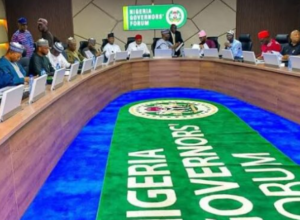20 Governors Borrow ₦446bn Amid Revenue Decline
20 Governors Borrow ₦446bn Amid Revenue Decline

In the first half of 2024, 29 state governments in Nigeria faced a significant financial strain, with debt servicing costs consuming 80.7% of their Internally Generated Revenue (IGR), according to The PUNCH. This situation compelled the governors to collectively borrow ₦446.29 billion, even though they saw a 40% increase in their statutory allocations from the Federation Account.
This data, analyzed from budget implementation reports on state websites and Open Nigerian States—an initiative supported by BudgIT—reveals alarming trends in fiscal management. The heavy debt obligations are diverting funds that could otherwise be used for critical public services and development projects, highlighting the ongoing struggles of state governments to manage inherited debts while addressing residents’ needs.
Despite the notable increase in allocations, there was an expectation that governors would have sufficient resources to meet their obligations. The rise in allocations followed significant policy changes, including the removal of the petrol subsidy and currency reforms, which reportedly boosted revenues by 40%. However, instead of reducing reliance on loans, many states are allocating substantial portions of their income to debt repayment.
Reports indicate that states like Osun, Ondo, Kaduna, and Cross River will largely use their FAAC allocations to service existing debts, with these states facing respective deficits of ₦10.94 billion, ₦27.72 billion, ₦15.83 billion, and ₦10.02 billion due to debt servicing deductions.
With such a large share of revenue tied up in debt repayment, achieving long-term economic stability and enhancing residents’ quality of life becomes increasingly challenging. Additionally, many debts are foreign, making them even more burdensome as currency depreciation exacerbates repayment difficulties.
The scrutiny of government spending has intensified amid the country’s economic challenges. Financial experts are emphasizing the need for innovation in fiscal management, particularly at the state level. Professor Segun Ajibola from Babcock University noted the persistent issue of high governance costs and the lack of effective oversight, leading to minimal benefits for the populace.
He pointed out that while attention often focuses on federal spending, the higher relative costs of governance at the state level are frequently overlooked. Most state assemblies fail to conduct effective oversight, allowing governors to operate with little accountability.
In total, 20 states borrowed ₦446.29 billion to address budget shortfalls and cover essential services. Most of these loans were obtained from multilateral and international lenders, contrary to the federal government’s push for domestic borrowing.
Notable borrowing includes Cross River State, which secured ₦121.22 billion, followed by Oyo with ₦55.36 billion, and Kogi with ₦41.22 billion. Other states, such as Katsina and Niger, also saw significant loans, while states like Edo, Osun, and Plateau borrowed the least, amounting to ₦633.73 million, ₦250 million, and ₦530.86 million, respectively.
TRENDING SONGS
 Trending Video: Muslim Man Joins Wife in Hallelujah Challenge ‘Dress Like Your Miracle’ Night
Trending Video: Muslim Man Joins Wife in Hallelujah Challenge ‘Dress Like Your Miracle’ Night
 Woman Seeks Advice as Late Brother’s Wife Refuses to Mourn Him Following His Death With Alleged Mistress
Woman Seeks Advice as Late Brother’s Wife Refuses to Mourn Him Following His Death With Alleged Mistress
 Nobody Cares About Fine Girls In The UK, I Miss Nigeria — Nigerian Lady Laments
Nobody Cares About Fine Girls In The UK, I Miss Nigeria — Nigerian Lady Laments
 Wedding Called Off: How Lady Cancels Wedding After Finding Out Finance’s Affairs With Her Bestie
Wedding Called Off: How Lady Cancels Wedding After Finding Out Finance’s Affairs With Her Bestie
 Heartbreak in Ikeja: Lady Weeps After Fufu Found in New Phone Package
Heartbreak in Ikeja: Lady Weeps After Fufu Found in New Phone Package
 Twist of Fate: Man Who Questioned Phyna’s ₦1Billion Demand Mourns Brother in Dangote Truck Crash
Twist of Fate: Man Who Questioned Phyna’s ₦1Billion Demand Mourns Brother in Dangote Truck Crash
 Tragedy in Enugu: Dangote Truck Claims Lives of Family of Five
Tragedy in Enugu: Dangote Truck Claims Lives of Family of Five
 Bangkok Crackdown: Nigerian-Thai Couple in Police Net Over Drug Trafficking
Bangkok Crackdown: Nigerian-Thai Couple in Police Net Over Drug Trafficking
 Family Rift: Reno Omokri’s Ex-Wife Says He Deserted Their Special Needs Son
Family Rift: Reno Omokri’s Ex-Wife Says He Deserted Their Special Needs Son
 The Man Who Sent Money for Two Decades, Only to Return to an Empty Shell
The Man Who Sent Money for Two Decades, Only to Return to an Empty Shell
Share this post with your friends on ![]()













